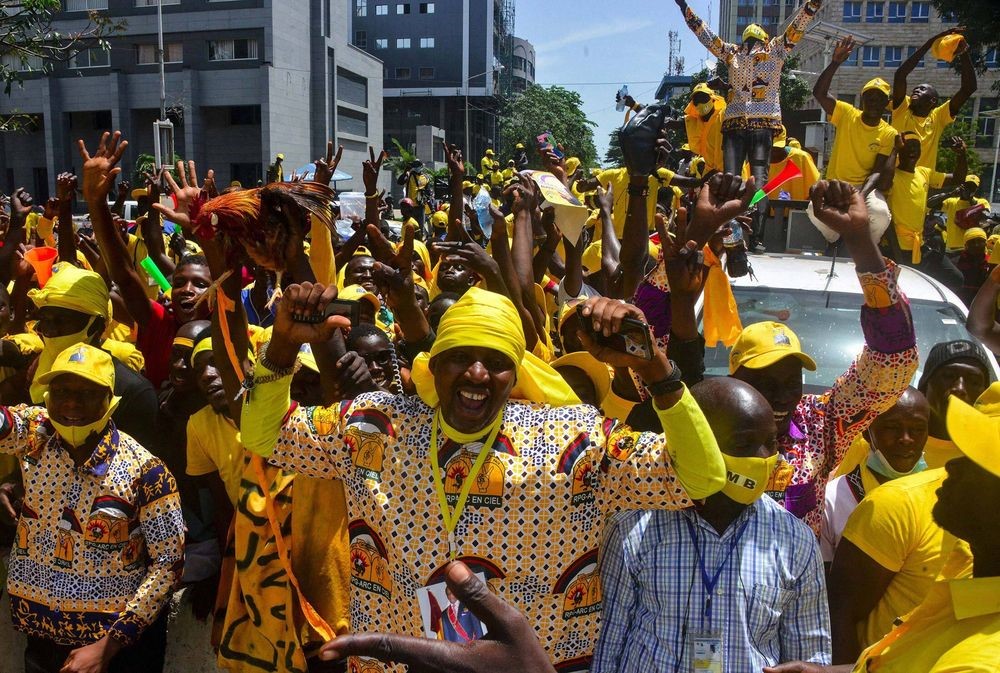
You better believe it: Zambia is one of the most beautiful countries in the world. Explorer David Livingstone, who described this land, said: “Such beautiful places have been created to soften the sight of angels in flight[1]“. A lush nature, a mild climate, a fertile and generous land, almost inexhaustible natural resources, a population of innate happiness, in which 73 different ethnic groups coexist and until recently, because a province was ravaged by famine and is fought for secession, do it in peace[2].
This is only one side of the coin. Zambia is the country where 58% of the population lives below the poverty line and has a per capita income of less than two dollars a day[3]. Only 13.41% of Zambians of working age are employed[4], many areas (especially far from cities) barter, slavery, lack health care, have no access to education or basic goods and services[5]. Drought is threatening[6], and this has led to persistent famine (also due to the poisoning of water sources[7]) in areas devastated by mining activities[8][9]. And then there is political violence: after independence, obtained in 1964, Zambia was drawn into the wars that raged among all its neighbors and lived under the dismal and ineffective leadership of President Kenneth Kaunda until 1990 – a regime which was forced to resign only after months of violent unrest and in the face of international pressure[10].
In the first democratic elections, the people vote for Frederick Chiluba: a union leader, an evangelical pastor, a trust account manager, a bus driver who is known to be full of inferiority complexes (he was only 151cm tall) and that he was paranoid, angry and at the head of a regime where corruption is king[11]. When Chiluba left the country in 2002 after more than ten years in government, after a brief interregnum by Levy Mwanawasa, Zambia’s new president was Michael Sata – a weak and corrupt leader who drove Zambia into misery and in 2014 , while still in power, died of an illness that was never revealed[12]. The new leader, Edgar Chagwa Lungu, promises the end of corruption and the beginning of prosperity. It becomes a symbol of the great hope of the Zambian people[13].
According to the official hagiography, Edgar Lungu was born on September 11, 1956 in the central hospital in Ndola, a town in the Copperbelt district, and that he grew up in the town of Chimwemwe, part of Kitwe[14]. His sister Chama denounces this information as a lie: The woman claims that there were no hospitals in Ndola at the time and that “a lot of untruths are told about his origins“[15]. And just as a lot of things remain silent: after high school, Lungu enrolls in the officer school in Miltez but only lasts a short time – he claims he eventually chose college, but in reality he s ‘got stuck because of “drunkenness, laziness and general misconduct“[16] and was expelled from the army.
Everyone in Zambia knows these problems: people call him “Kaminamisa” (drunkard)[17]. Lungu defends himself by denying everything, saying in an interview in 2019: “I stopped long before even having a first beer“[18]. What is true is that he graduated from law school in October 1981[19] and was admitted to the bar a year later by joining the law firm Andre Masiye & Co. in Lusaka[20]. He did not get involved in politics until much later, in 1999, when he became a member of the UPND (United Party for National Development[21]) and only two years later he switched to the newborn PF (Patriotic Front[22]), where career opportunities are better, and he becomes advisor and associate to President Michael Sata[23].
The difficult climb to the top
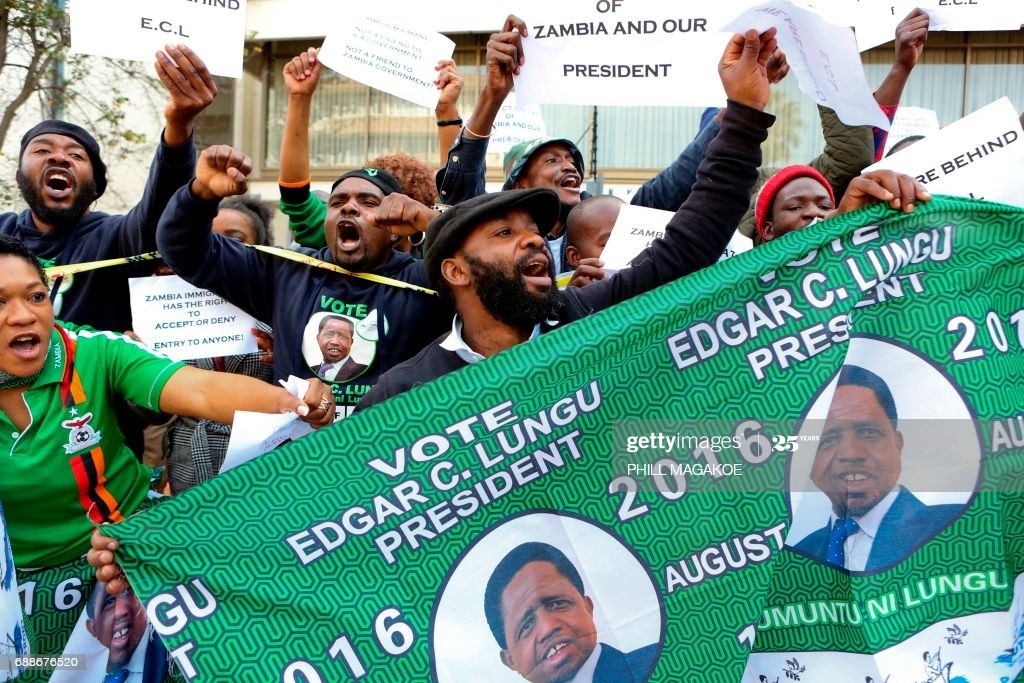
A demonstration by supporters of President Lungu few months after the 2016 presidential election
Lungu presents himself as a believer in honesty, but he behaves the other way around. In July 2009, he lost his license to practice as a lawyer: one of his clients, Wendy Kanyanta, was entitled to a refund of 40,000 kwacha ($ 1,900) after a civil action – money, which Lungu claimed and received from the opposing party and, instead of delivering it, kept it for himself. For this, in August 2010, Lungu was ordered to pay compensation[24] and revoked his license to practice law[25].
His friends don’t forget him. In the 2011 elections, immediately after the victory of the Patriotic Front, the newly elected President Michael Sata appointed him deputy minister, then interior minister (although he intervened in a completely drunk parliamentary session[26]) then minister of Defense[27] as predecessor Winter Kabimba is discharged[28]. On the same day, Lungu succeeded Kabimba as secretary general of the Patriotic Front[29].
Towards the end of 2014, critically ill President Sata had to travel abroad for medical treatment[30]. At this point, Lungu was given provisional control of the country. In October, Sata passed away[31] and Vice President Guy Scott took over from the Interim President[32]. A few days later, on November 3, 2014, Guy Scott dismissed Lungu from the post of national FP secretary[33] – but only returned it to him the next day: Lungu had long worked in the shadows and rose to a position of great power[34]. When the new presidential election comes, Lungu presents himself as a man of faith and peace – but his party colleagues describe him as “a ruthless and heartless politician who preaches peace by day and organizes political violence at night“[35].
He turns out to be a fundamentalist and a chauvinist and promises to deny the right to homosexuality[36]. During the campaign, the Patriotic Front used violence and indiscriminate arrests to intimidate political opponents[37]. On January 20, 2015, despite fierce fighting within the FP[38], Lungu won the presidential elections by a very small majority against Hakainde Hichilema of the UPND: only 32.4% of the electorate voted, Lungu won 48.3% of the consensus against 46.7% of Hichilema[39]. The country is divided into two parts: “Tribe against tribe, brother against brother and friend against friend[40]”. Hichilema is accused of electoral fraud[41], but that doesn’t help: Lungu is named president in a lavish ceremony at National Heroes Stadium in Lusaka[42].
Debt, international pressure, blood and corruption
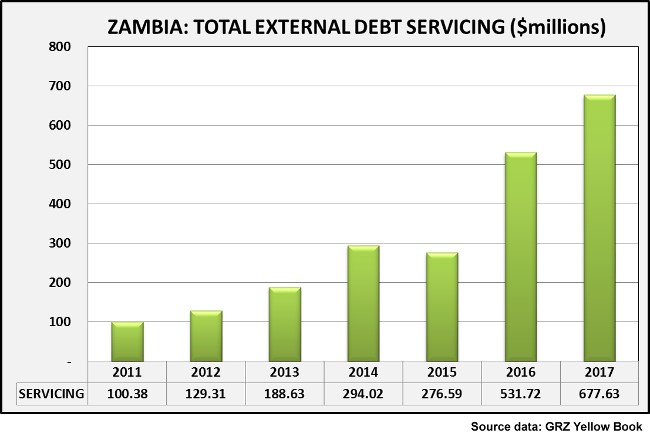
The steady growth in the national debt under the presidency of Edgar Lungu[43]
Zambia is in a deep crisis. Economic growth between 2014 and 2015 slows from 5% to 3.2% and commodity prices are falling[44]. Copper sales (which are in the hands of Vedanta, Barrick Gold, Glencore and First Quantum Minerals) account for 70% of Zambian exports, going from $ 7.2 billion to about half[45]. Lungu cuts energy and agricultural subsidies, which has increased the budget deficit to almost 10% of GDP and generates annual inflation of around 20%, as interest is paid on a 2012 loan signed by Sata with the Union European[46].
Lungu arrives at the next presidential election with a dying country: with the devaluation of the kwacha by 41%[47], with a third of the working population unemployed, with the closure of some mines, with a serious energy crisis and rising food prices[48]. The International Monetary Fund is forcing Lungu to bring the presidential elections forward until 2016[49]. The electoral campaign is marked by serious clashes between parliamentary groups, the declaration of a state of emergency and cruel police violence, which, for example, attacks the critical opposition newspaper Post with tear gas and batons, shuts them down after they have been evacuated and forces staff to shoot[50]. After the elections he ordered the compulsory wind-up of the company[51].
The National Election Commission threatens to suspend the vote, but the government insists[52]: Lungu is re-elected with 53% of the vote[53]. Hichilema UNPD appealed to the Constitutional Court, accusing election officials of fraud without receiving anything[54]. In view of the situation, the IMF decided in September 2018 to suspend aid to Zambia and Lungu expelled the Fund’s representative in Lusaka, Alberto Baldini, from the country for spreading “negative rumors” about Zambia[55].
The Monetary Fund has good arguments against the Lusaka government: the inexorable rise in debt, mainly due to corruption, with the non-payment of civil servants’ salaries; The contracts signed with China for more than 8 billion dollars in loans, for which the land will be sold piece by piece[56]: Beijing should take over the ZNBC Zambia National Broadcasting Corporation as payment, then the national electricity company Zesco[57] and finally , according to the agreements made by Lungu Lusaka International Airport[58].
A report published by Africa Confidential indicates[59] $ 4.7 million in bribes for fraud against three government departments: health, education and economic development. Africa Confidential personally accuses some ministers responsible for the looting of funds of buying counterfeit drugs, stealing pension funds and stealing social and education spending budgets[60].
One of the protagonists of the scandal is Emerine Kabansky, Deputy Minister of Community Development and Social Security[61], who looted ZAMPOST (Zambia Postal Services Corporation[62]). She has been forced to resign[63] and is then arrested[64]. Research shows she embezzled $ 4 million[65]. Part of the investigation concerns another fraud, still against ZAMPOST[66], which Kabansky committed with a fired postmaster, McPherson Chanda[67].
Financial Intelligence Center (FIC)[68] report shows that in 2018 alone, the state lost 6.1 billion Kwacha (about $ 336 million)[69] due to illegal transactions (corruption, theft, fraud and tax evasion). In July 2019, Treasury Secretary Margaret Mwanakatwe is due to resign without official declaration[70]. The Deputy Governor of the Central Bank, Bwalya Ngandu, will be appointed in their place.
In December 2019, the Mukula scandal broke out (name of a precious wood tree, a species protected by WWF)[71]. According to a report by the Environmental Investigation Agency (EIA)[72], a cartel made up of President Edgar Lungu, his daughter Tasila Lungu, Minister of Justice Given Lubinda and Minister of Lands and Natural Resources Jean Kapata deforests and smuggles tons of plants and wood: between June 2017 and May 2019, there are 40 monthly containers, or about 2000 cubic meters per month, which generate 7.5 million dollars per year on the black market and are bagged by members of the conspiracy[73].
A predictable bankruptcy
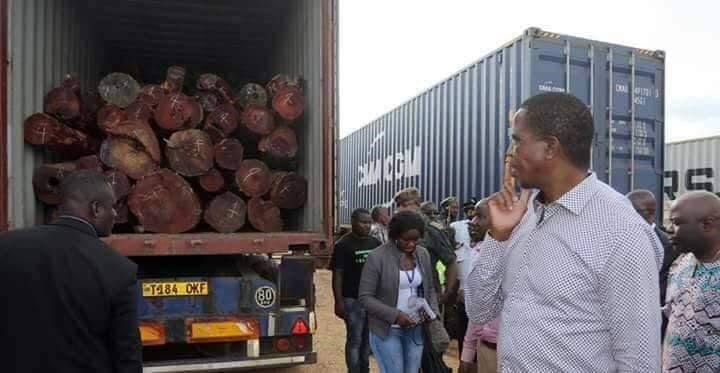
Edgar Lungu is filmed in front of the containers of his macular wood smuggling organization[74]
Since the Makula scandal, the situation worsened. In May 2019, the Moody’s rating agency downgraded Zambia’s national debt from CAA1 to CAA2: “External pressures and liquidity issues are affecting the government’s ability to manage debt over the medium term and also increase the likelihood of default on short-term debt”[75]. The UK, Finland, Sweden and Ireland suspend economic aid payments to Zambia. The London government blocks a £ 47million[76] relief plan and brings Lungu to its knees. Growing social tensions are quelled with violence, politicians and bureaucrats are arrested, human rights violations multiply, but the president resists and announces that he will shirk all responsibility[77].
Lungu emphasizes his innocence even as he spends State money (which is non-existent) on extravagance and personal luxury[78], like the purchase, for $ 45-49 million[79], of a Russian-made Jet Sukhoi VIP business for the President’s travels – plus four other Sukhoi aircraft for civil aviation[80]. According to Africa Confidential, the supply contract signed with Israel would include more than $ 400 million in high-tech equipment (such as 18 Skylark mini-drones, an unknown number of F-5 supersonic fighters, ground vehicles and helicopters of Mi-17E transport) for the military sector, which was partially financed by a loan from the Israeli Bank Hapoalim[81]. Madness confirmed by the auditor general of public finance management[82].
In December 2019, Africa Confidential found that the government had failed to honor the € 97 million loan from the San Paolo Institute in Turin, which Lungu had used to pay for two C27J military transport aircraft of the Italian military industry Leonardo[83]. The C-27J Spartan is a turboprop aircraft that can operate on rudimentary runways and in extreme conditions[84]. To get the money, then Finance Minister Margaret Mwanakatwe pledged to avoid taking further loans[85].
Although the bank files five interest payment requests with a term until October 30, 2019 for 6.2 million euros, the down payment remains pending[86]. The bank therefore imposes a contractual fine of 20,000 euros per week, also because it is not an isolated case: “The Gulfstream G650 business jet used by President Lungu and President Lungu and an order of five Sukhoi planes are also part of the madness of buying a Zambian plane. Russia canceled the order on October 28 after Zambia failed to make the second payment”[87].
In April 2019, terrorist Nsabimana Callixte, leader of the Rwandan revolutionary group National Liberation Force (NLF), whose criminal record shows murders, bombings, kidnappings and looting, was arrested by the RIB (Rwanda Investigation Bureau)[88]. Callixte, questioned by the International Tribunal in The Hague on July 13, 2020, pleads guilty and says he was hired by Edgar Lungu for $ 150,000 at the end of 2017 to help the leader of the Rwandan opposition party, the MRCD, Paul Rusesabagina, overthrow the government of Paul Kagame by a coup[89]. Lungu, of course, denies everything[90].
The pandemic is the final blow. Officially, there have been 17,000 infections and 350 deaths in Zambia[91], but these are figures without credibility. International organizations estimate that there are 1.8 million infected people, but fortunately the mortality is very low due to the very young age of the population[92]. The effect, however, is the partial closure of the mines, as well as that of other economic activities[93]: the lockdown of Victoria Falls, which attracted over a million tourists in 2019 and created a dizzying incentive (7.2% of the population[94] a chopper on the already bad accounts of the government[95]. Schools and universities, bars and restaurants, cinemas and casinos are closed; Gathering of more than 50 people is prohibited, sports activities are blocked, entry and leaving the towns of Kafue and Nakonde are prohibited, the border with Tanzania (which is the most important for trade and smuggling)[96] will be closed.
Lungu admits: The country is just inches from bankruptcy[97]. He asks the International Monetary Fund to repay the external debt and to renegotiate the terms of the bonds: on September 22, the state should have paid the bonds issued in 2012, 2014 and 2015 – that’s $ 3 billion that is never paid to creditors therefore cause irreparable damage[98]. The last hope is that mining will save Zambia. It is still the only economic and industrial sector that can still add value, but it is almost entirely in the hands of foreign capital.
The first serious mining scandals
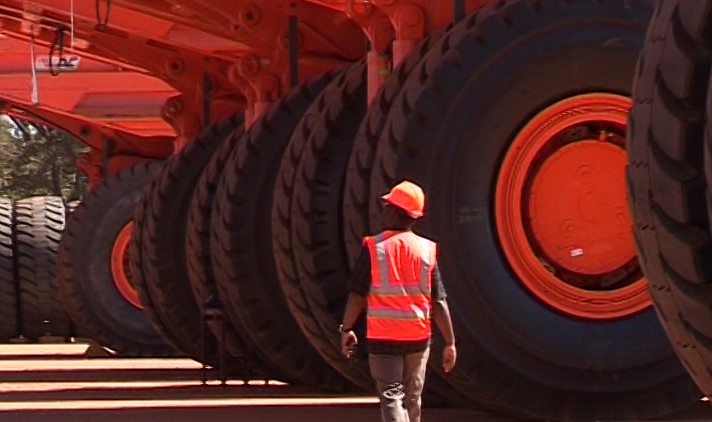
Giant bulldozers digging into Zambia’s largest copper mine, the Lumwana Copper Mine. The mines cover an area of 1355 km2 and are almost the size of the city of London; its operation is in the hands of the infamous Canadian multinational Barrick Gold[99]
Industrial copper production in Zambia began exactly a century ago when Irish-American billionaire Alfred Chester Beatty founded the Rhodesian Selection Trust (RST) and inaugurated the mines of Luanshya (1928) and Mufulira (1933)[100]. Until 1960, copper mining developed steadily and brought new prosperity – at the time of Zambia’s independence, the mines produced 769,000 tons per year and employed 62,000 people[101].
The newborn state decides to nationalize the entire sector[102] and creates the ZCCM Zambia Consolidated Copper Mines[103]. Income is reinvested in railways, roads, hydroelectric power stations, schools, hospitals and social housing, and machines are not renovated – production drops by two-thirds, the whole system is in crisis[104]. In 1996, President Chiluba decided to sell the mines and rely on tax revenues[105]. Foreign multinationals have invested $ 12.5 billion over 14 years to bring production back to 60 years ago and bring employment to nearly 100,000 jobs[106]. The price is high. Multinational companies do what they want: pollution, human abuse, tax evasion.
The most unscrupulous seem to be the Chinese. According to Human Rights Watch, they systematically practice mistreatment, abuse and threats, especially in the case of the Non-Ferrus Metals Mining Corporation (CNMC)[107], which has imposed inhumane shifts since 1998, deciding to have rest days and the use of rooms are contaminated with a high concentration of dust – without any safety measures, threats or strikes[108].
The government only reacted in 2013: the CNMC permit for the Collum coal mine, now managed by the ZCCM, was revoked[109]. But this is not enough, other Chinese companies continue[110]. In 2016, a Chinese criminal gang was discovered forcing children between the ages of 10 and 16 to steal copper and other minerals from abandoned mining areas[111]. Another gang that has been licensed to operate the Chingola copper mine almost exclusively employs children between the ages of 10 and 12[112].
To optimize profits, many other companies instead focus on tax evasion: according to the NGO War On Want (2015), Zambia would lose $ 3 billion in taxes per year, which is bypassed by large companies mining companies in the country: Glencore, Vedanta and Associated British Foods[113]. According to Owen Espley, author of the War on Want study, the government cannot retaliate because it has been blackmailed with the threat of cutting thousands of jobs – a threat that leaves member governments of the OECD indifferent[114].
In 2018, the UN denounced massive tax evasion ($ 50 billion across Africa)[115] and forced Lungu to pass tougher laws[116]. Laws that the state cannot enforce[117], even if it is a public company: in May 2020, the Supreme Court of Lusaka condemns the MCM Mopani copper mines (73.1% Glencore, 16, 9% First Quantum Minerals, 10% ZCCM[118]), with an arbitration award, to pay 240 million kwacha (approximately $ 13 million) for tax evasion caused by selling MCM’s copper cost to Glencore’s refineries below cost[119].
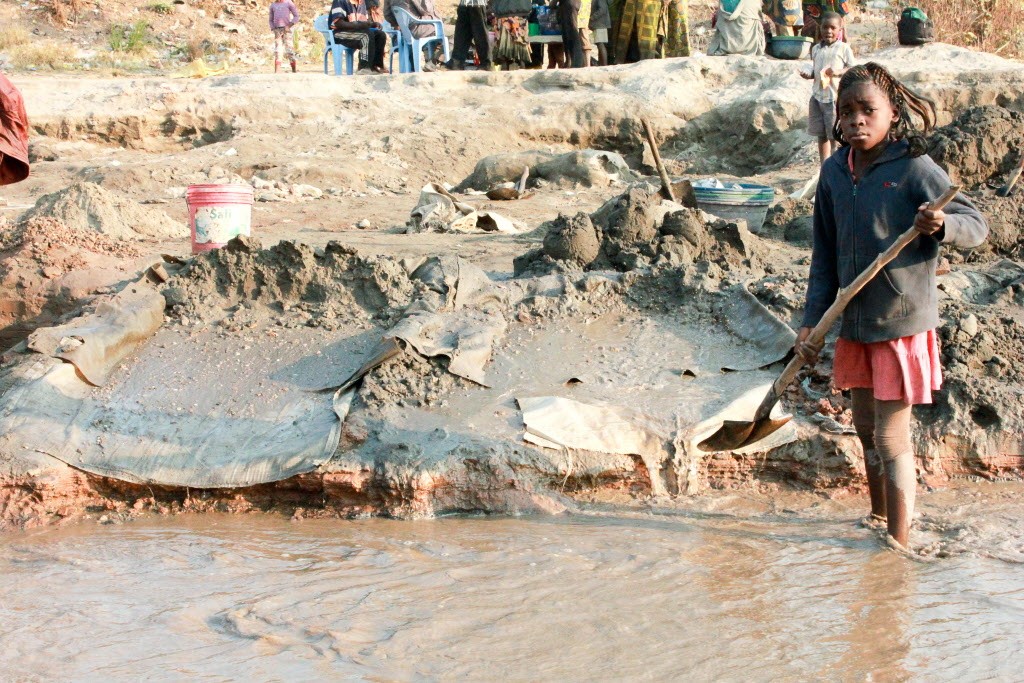
A 12-year-old boy who works in China’s Chingola mine[120]
Added to this is the now irreparable damage to the environment, especially in the Copperbelt province, the most densely populated part of the country[121]: industrial copper mining has radically changed the landscape. Mines move millions of tons of earth and mud, divert streams and rivers, and poison the makeup of the air[122]. There are at least 21 dumps with an area of more than 388 hectares, 9 slag heaps with an area of 279 hectares and finally more than 45 dams with an area of approximately 9125 hectares. In total, more than 10,000 hectares of the Copper Belt are covered with waste and cannot be inhabited or cultivated[123].
The most emblematic case is that of Mulifura and the three municipalities affected by the excavations (Kankoyo, Butondo and Zimba), destroyed by sulfur dioxide fumes[124] and seriously threatened by cracks and landslides[125]. The mine poisoned the surrounding streams, made the water unsafe for drinking, and destroyed livestock, agriculture and fishing[126]. A disaster occurred west of Kitwe, where the Chibuluma mine is located, the neighborhood of which has been abandoned by humans and animals as the water is poisoned with acids and toxic residues of copper and cobalt[127].
In Kabwe, in the same area, despite the mine being closed over 25 years ago, there is still a ten-meter-high hill called The Black Mountain, which is made up of smelter scrap, rubble and various types of waste[128]. Many children in the neighborhood developed cancer or died of lead poisoning[129]. From 2003 to 2011, the World Bank financed the rehabilitation program of the Copperbelt Environment Project: the state collected the money and never completed the work[130].
One of the companies whose operations have caused the most environmental damage is Vedanta Resources, an Indian multinational based in London[131]. The first allegations about the environmental impact of the Konkola mines date back to 2009[132], but the problems started five years later when the NGO Foil Vedanta published a report on the multinational’s ties to President Sata’s announcement that documented widespread pollution of mining areas managed by Vedanta, as well as the abuses the company inflicts on workers[133].
A year later, 1,826 Zambian farmers filed a lawsuit against Vedanta Resources in the London court and won the first court case – the case now lies with the Supreme Court[134]. As in other cases, the Minister of Mines, Richard Musukwa, defends Vedanta with all his might by testifying in court and overturning court decisions in Zambia[135]. In May 2018, workers protested, police shot and killed 12 protesters – and at that point, President Lungu changed his position and closed the Konkola mines[136].
In August 2019, the Lusaka government filed a request to deport Vedanta from Zambia, proposing a sanction for this group of companies on the London Stock Exchange[137]. The state has imposed a liquidator on KCM – the company that manages the Konkola mine, and Vedanta has no choice but to seek the path of international arbitration as the multinational has more than $ 3 billion in business[138]. the mine from 2004 to 2018 invested. Additionally, in November 2019, Vedanta agreed to impose a fine of $ 203 million on the state of Zambia[139]. The mine is now nationalized (it is controlled by the ZCCM) and even today Richard Musukwa has changed his mind and calls for criminal proceedings against Vedanta leaders[140].
The Kalengwa mining scandal
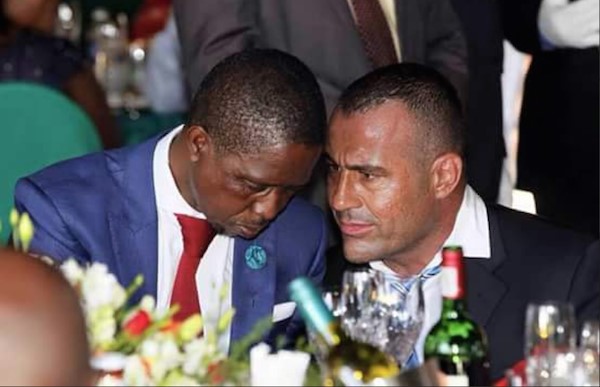
Edgar Lungu in intimate attitude with gangster Shawi Fawaz[141]
In 1969, after the nationalization of mining, the major copper mines were concentrated in one company, RCM (Roan Consolidated Mines Limited)[142], 51% owned by ZIMCO (Zambia Industrial and Mining Corporation, which merged with ZCCM in 1981[143]) and 49% to a consortium led by a New York mining company, AMAX Inc., which was one of the largest multinational companies in Africa[144]. Between 1981 and 1982, the MRC was dismantled and the mine closed[145] due to the crisis in Zambia[146].
In the years that followed, Kalengwa was exploited by jobless miners seeking minimum income, most of whom hunted for copper in the huge open pit mine that remained, in 1982, after mine no has not been cleaned[147]. In 2008, the mine was occupied by Euro African Kalengwa Mining Limited (EAKM), which received a government permit in 2010. EAKM is a consortium of local tribes[148] led by Chief Mukumbi Kizela[149] and King Mulumba Datuuma II (Mathew Sweta Kanong ‘esha), a disciple of Edgar Lungu[150].
In 2011, EAKM’s license was suspended and the government surprisingly transferred the license to ACR African Consolidated Resources Plc London (now called Vast Resources Plc)[151]. It is an English and Romanian capital company founded in 2004 which operates in Romania and Zimbabwe where it owns a diamond mine[152]. The transfer of the license unleashes a real war that continues today in the courts and in the streets, where EAKM supporters demonstrate armed with sticks and sabers and crush everything in their path[153].
This war hides a more complex and dangerous confrontation: in the 1990s, a gangster appeared, Shawi Fawaz, a Lebanese immigrant, who organized small illegal copper collectors, and in exchange for food and medicine, protection and supplies, he claims up to 60% of the collected proceeds that every illegal collector gets each working day[154]. Each of his slaves chooses the Patriotic Front and supports Edgar Lungu and Michael Sata with violent and intimidating actions[155].
Shawi Fawaz quickly became the most powerful Jerabos (Mafia godfather) in southern Africa, and when courts in Lusaka sentenced him to a total of 25 years in prison (1989 for drug trafficking and theft of copper; 1994 for the murder of a trade unionist, Grant Kolala; 1998 for trading in slaves, drugs, prostitutes and various acts of violence[156]), Edgar Lungu personally intervenes and grants him pardon – and advises him to change his method in what concerns the mines of Kalengwa: Enough with the Mafia protection of irregular collectors, rather the establishment of two mining companies transforming 2000 irregular workers into employees of a regular company[157] – Hetro Mining & Ore Ltd. Kitwe and Lunga Minerals & Exploration Ltd. Kitwe[158].
African Consolidated Resources (ACR) wins the legal (and military) fight against the small business of local tribal chiefs (EAKM), thanks to a strategic decision by its biggest shareholder and president Colin Bird: he does not fight Fawaz, but concludes a contract sold him a percentage of his business and, a few years later, changed his name to Xtract Resources[159]. In this way, Fawaz and Lungu share the profits[160] of other ACR companies: the Gadzema gold mine, the Pickstone-Peerless gold mine and the Nkombwa Hill diamond mine[161].
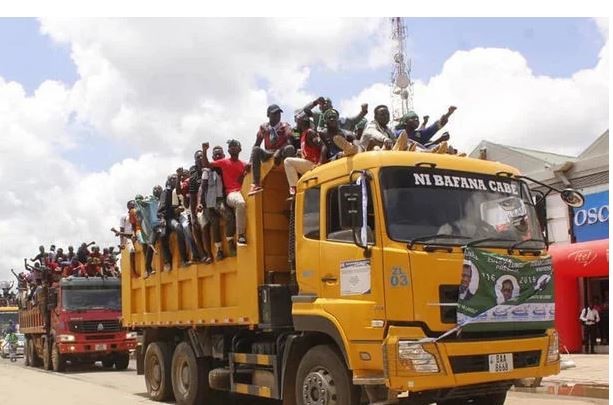
Shawi Fawaz’s militias, crammed into the trucks of President Edgar Lungu’s supporters, reach the fences of the Kalengwa mine in August 2019, where, seconds after this photo, they will unleash hell[162]
The tribes of Zambia do not give up and find a powerful ally: the English mining group Moxico Resources Plc London, which already operates in the area called the Chingola Cluster[163] thanks to the concession of the Mimbula min[164]e exploration permit and the permit of exploration of a new mine in Zambia. Moxico is also opening up to share purchases for Zambian citizens[165] and making an offer for the license to use Kalengwa – an offer accepted by the state administration – but ignored by Colin Bird and Shawi Fawaz and refuted by following by a decree of Edgar Lungu[166].
With the continuation and deterioration of the fight against Xtract Resources, Moxico brings together the Zambian partners in an offshore holding, Moxico Resources Ltd. Port Louis[167], which was dissolved following the victory of the Moxico group in the Lusaka Supreme Court case on March 28, 2017[168]. This judgment was later confirmed again after Lungu suspended the application of the judgment by a decision of July 22, 2019[169].
Bird and Fawaz’s response: Days after the verdict, in early August, militiamen in Jerabo attacked security forces and workers in Kalengwa – ruthlessly beat them, then kidnapped, tortured and killed some of them[170]. The Lungu government reacts by overturning the Supreme Court’s decision with an illegal decision by Richard Musukwa’s mining department[171]. The next day, the Fawaz militiamen occupy the mine and start working with their staff after the Moxico fled in fear[172].
At this point, Xtract Resources is trying a hard blow: the company sells its illegal license to a new company, KPZ Kalengwa Processing Zone Ltd. Lusaka[173] which belongs to a newly created offshore holding company, KPZ International SA Tortola (BVI)[174]. KPZ International sells 30% of its alleged exploitation rights[175] to Colin Bird’s new multinational and to its British partner: Bezant Resources Plc London[176].
In the meantime, however, the pressure from the International Monetary Fund has increased enormously, and given the risk of sovereign default, President Lungu will at least apparently stop protecting Shawi Fawaz in the fall of 2020. This one, this time, is at risk. really jail[177] – but this dispute, even if it was settled in court in favor of Moxico Resources, is not yet over: currently the men of KPZ International are still working in Kalengwa, and there is no end in sight[178].
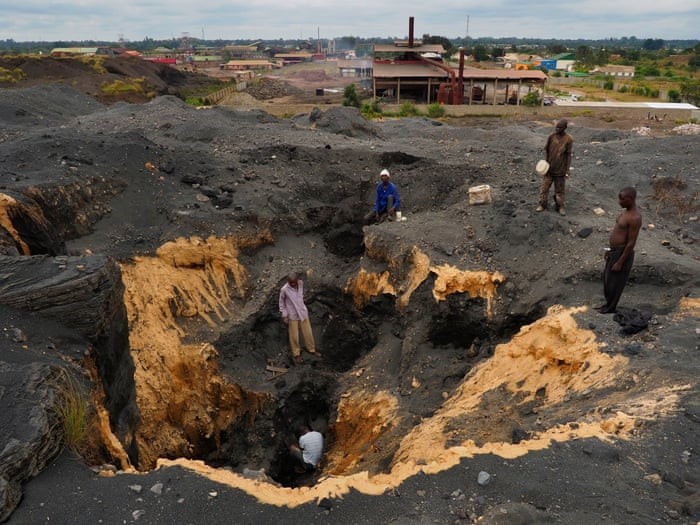
Zambian Ministry of Health agents search garbage piles for toxic waste that has made Kabwe the most poisoned city in the world[179]
This nasty story is starting to become normal practice: Colin Bird is also chairman of the board of another mining company, Jubilee Metals Group Plc London[180]. On June 19, 2020, Jubilee Metals officially announced that it had acquired the rights to process 150 million tonnes of high copper grade sand[181] from Star Tanganika Ltd[182]. Lusaka will be processed at the Jubilee refinery in Sable, Zambia.
Star Tanganika is owned by two Greek businessmen who have lived in Lusaka for more than twenty years, Dimitrios Monokandilos and Kosmas Mastrokolias – both known to be fraudsters in court for twenty years[183]. Jubilee Metals donates $ 5 million, only to find that those 150 million tonnes did not belong to Star Tanganika – however, the press in Lusaka suspected that Jubilee Metals knew from the start that copper would never get it and that this 5 million were paid for some secret and probably illegal reason[184].
The facts we relate clearly show that Zambia currently has no hope of coming out of the crisis on its own. Dambisa Moyo herself, a Lusaka-born economist and today one of the foremost authors on African subjects, caused a sensation in 2009 with a book in which she explained how hundreds of billions of dollars have spent after World War II to support the development and emancipation of the African continent were not only unnecessary but also harmful, as these funds financed dictatorships and tribal wars, as well as infrastructure works that only enriched the western companies that built them[185].
Now, more than ten years later, the same author believes that overthrowing regimes (like Edgar Lungu’s) would only lead to greater destabilization, more violence and more misery – and she advocates a plan Marshall for Africa, to force governments (democratic or not) to take the paths that are no longer specified by the International Monetary Fund (which often serves the interests of large industries and big banks), but by UN organizations which are already the most serious access situations: famines, epidemics, environmental poisoning, geological disasters, refugees from wars and other persecutions[186].
Those who, like us, deal with these things every day are left speechless. The politico-commercial-criminal alliance between President Lungu and a mafia leader like Shauwi Fawaz is an intolerable fact, but at the same time incomprehensible, because shown in public with such arrogance … The only certainty is that after the dictatorship by Frédéric Chiluba and the years of institutionalized corruption by Michael Sata, under the presidency of Edgar Lungu, Zambia has fallen from the pan into the fire. And it burns.
[1] http://www.eyewitnesstohistory.com/livingstone.htm
[2] http://www.fides.org/it/news/35497-AFRICA_ZAMBIA_L_ineguale_distribuzione_della_ricchezza_nazionale_contribuisce_a_provocare_tensioni_etniche
[3] https://worldpoverty.io/map
[4] https://www.statista.com/statistics/809085/unemployment-rate-in-zambia/
[5] https://media.africaportal.org/documents/Recounting_the_Miseries_of_the_Poor_.pdf
[6] https://www.lifegate.it/siccita-zambia-cascate-vittoria-carestia
[7] https://www.lifegate.it/miniera-piombo-kabwe-zambia
[8] https://www.facing-finance.org/en/2016/02/collum-coal-mining-collapsed-tunnels-destroy-zambian-village/
[9] https://www.bloombergquint.com/business/zambia-copper-mine-waste-dam-bursts-destroying-crops-mail-says
[10] Andy DeRoche, “Kenneth Kaunda, the United States and Southern Africa”, Bloomsbury, London 2016
[11] http://news.bbc.co.uk/2/hi/africa/1715419.stm
[12] http://ibiworld.eu/2020/10/09/le-mele-marce-del-paradiso-terrestre/ ; https://ibiworld.eu/en/rotten-apples-in-the-garden-of-eden/
[13] Anthony Mukwita, “Against all odds: Zambia’s President Edgar Chagwa Lungu’s rough Journey to State House”, Partridge Africa, Johannesburg 2016
[14] https://www.sh.gov.zm/?page_id=5164
[15] https://www.zambiawatchdog.com/there-was-no-hospital-when-lungu-was-born-sister/
[16] https://www.zambianobserver.com/flashback-edgar-lungu-was-discharged-from-army-for-drunkness/
[17] https://web.archive.org/web/20131226111143/http://www.zambianwatchdog.com/edgar-lungu-is-new-defense-minister/
[18] https://mwebantu.news/hh-is-telling-people-that-i-drink-beer-i-stopped-drinking-president-lungu/
[19] https://www.pindula.co.zw/Edgar_Lungu#cite_note-profile-1
[20] https://youthvillagezm.com/2019/06/10-things-you-didnt-know-about-edgar-lungu/
[21] https://upndzambia.org/ ; www.edgar-lungu.com/wp-content/uploads/2014/12/EL-Profile_web.pdf
[22] https://www.pindula.co.zw/Edgar_Lungu
[23] https://www.theafricareport.com/3261/spotlight-on-zambias-president-edgar-lungu/
[24] https://www.zambiawatchdog.com/how-edgar-lungu-stole-clients-money/
[25] https://zambia.co.zm/news/headlines/2010/07/29/laz-suspends-misa-lawyer-edgar-lungu/
[26] https://www.zambiawatchdog.com/drunkard-pf-minister-edgar-lungu-prompts-point-of-order-in-parliament/ ; https://www.zambiawatchdog.com/flashback-zambia-reports-says-lungu-is-an-alcoholic-decisions-impaired-by-beer/
[27] https://web.archive.org/web/20131226111143/http://www.zambianwatchdog.com/edgar-lungu-is-new-defense-minister/
[28] http://ibiworld.eu/2020/10/09/le-mele-marce-del-paradiso-terrestre/ ; https://ibiworld.eu/en/rotten-apples-in-the-garden-of-eden/
[29] https://www.theafricareport.com/3261/spotlight-on-zambias-president-edgar-lungu/
[30] https://www.zambiawatchdog.com/sata-will-soon-go-to-london-for-medication/
[31] https://www.bbc.com/news/world-africa-29813612
[32] https://www.repubblica.it/esteri/2014/10/29/news/michael_sata_morto_zambia-99242316/
[33] https://www.lusakatimes.com/2014/11/03/guy-scott-drops-edgar-lungu-pf-secretary-general/
[34] https://www.lusakatimes.com/2014/11/04/guy-scott-reinstates-edgar-lungu-secretary-general-burial/
[35] https://africanarguments.org/2016/08/16/humble-mother-loving-and-god-fearing-how-edgar-lungu-won-zambias-presidential-election/
[36] https://www.lusakatimes.com/2014/12/13/edgar-lungu-says-cant-abandon-satas-vision-will-support-gay-rights/
[37] https://news.yahoo.com/zambian-police-tear-gas-opposition-supporters-poll-132706659.html
[38] https://blogs.lse.ac.uk/africaatlse/2015/01/19/zambia-presidential-elections-why-is-it-so-hard-to-predict-a-potential-winner/
[39] http://country.eiu.com/article.aspx?articleid=582750442
[40] https://www.pambazuka.org/governance/zambia%E2%80%99s-election-now-president-lungu-must-address-serious-issues
[41] https://www.voanews.com/africa/zambias-new-president-sworn-office
[42] https://www.lusakatimes.com/2015/01/25/edgar-lungus-inaugurated-colourful-ceremony/
[43] https://www.lusakatimes.com/2020/02/12/263055/
[44] https://www.bloombergquint.com/onweb/zambian-president-lungu-faces-challenge-to-repair-economy
[45] https://old.danwatch.dk/undersogelseskapitel/long-way-round-how-zambian-copper-is-entering-the-eu/
[46] https://www.bloombergquint.com/onweb/zambian-president-lungu-faces-challenge-to-repair-economy
[47] https://www.bloomberg.com/news/articles/2015-09-25/barclays-sees-zambia-acting-to-stem-world-s-worst-currency-fall
[48] https://www.reuters.com/article/us-zambia-election-idUSKCN10Q13R
[49] https://www.reuters.com/article/zambia-imf-idUSL5N16Q3FN
[50] https://www.irishtimes.com/news/world/africa/zambia-s-president-edgar-lungu-plotting-dictatorship-1.3156944
[51] http://www.daily-mail.co.zm/laz-applies-to-join-post-case/ ; http://www.daily-mail.co.zm/court-declares-the-post-insolvent/
[52] https://zambialaws.com/Bulletin-2016/(35)%20Electoral%20Process%20Act%2035%20of%202016.pdf ; https://www.nigrizia.it/notizia/zambia-clima-politico-sempre-piu-violento-interviene-commissione-elettorale
[53] https://qz.com/africa/758213/zambias-incumbent-president-has-won-reelection-but-only-just/
[54] https://www.aljazeera.com/news/2016/8/16/zambia-arrests-133-protesters-after-contested-election
[55] https://www.africa-confidential.com/article-preview/id/12424/Bonds%2c_bills_and_ever_bigger_debts
[56] https://southerntimesafrica.com/site/news/zambia-denies-its-debt-burdened ; https://www.zambianobserver.com/zambia-risks-losing-sovereignty-to-china-africa-confidential/
[57] http://www.chinagoabroad.com/en/article/china-to-take-over-zesco-africa-confidential
[58] https://www.africa-express.info/2018/09/21/lo-zambia-non-riesce-a-pagare-i-debiti-e-la-cina-e-pronta-a-prendersi-il-suo-aeroporto/ ; https://www.kaieteurnewsonline.com/2018/09/14/china-to-take-over-zambian-intl-airport-for-default-on-debt-repayment-chinese-already-own-60-shares-in-the-countrys-national-media/
[59] https://www.africa-confidential.com/article-preview/id/12429/Graft_worsens_cash_squeeze
[60] https://www.theguardian.com/global-development/2018/sep/19/zambia-aid-payments-suspended-over-corruption-allegations
[61] https://www.wikidata.org/wiki/Q29539929
[62] https://www.zampost.com.zm/Home.html
[63] https://www.zambianobserver.com/president-edgar-lungu-fires-emerine-kabanshi-zampost-chief-mcpherson-chanda/
[64] https://lusakastar.com/news/kabanshi-arrested-over-social-cash-transfer-corruption-scandal
[65] https://www.zambianobserver.com/president-edgar-lungu-fires-emerine-kabanshi-zampost-chief-mcpherson-chanda/
[66] https://zambiareports.com/2019/05/15/former-minister-kabanshi-arrested-abuse-authority/
[67] https://mwebantu.news/zampost-chief-fired-in-social-cash-transfer-scandal/
[68] https://www.fic.gov.zm/79-fic-news/106-mutual-evaluation
[69] https://www.phoenixfm.co.zm/news/zambia-lost-k6-1-billion-to-financial-crimes-in-2018/
[70] https://www.reuters.com/article/us-zambia-economy-financeminister-idUSKCN1UA0BF
[71]https://www.cites.org/eng/CITES_conference_responds_to_extinction_crisis_by_strengthening_international_trade_regime_for_wildlife_28082019
[72] https://content.eia-global.org/assets/2019/11/Mukula_Cartel-HiRes.pdf ; https://eia-international.org/
[73] https://eia-global.org/reports/20191205-mukula-cartel-zambia-report
[74] https://www.zambianobserver.com/lungu-must-clear-his-own-name-not-sunday-chanda-or-emmanuel-mwamba-upnd/
[75] https://www.news24.com/fin24/economy/africa/zambia-president-fires-finance-minister-replaces-her-with-deputy-governor-20190715
[76]https://assets.publishing.service.gov.uk/government/uploads/system/uploads/attachment_data/file/630904/Zambia.pdf
[77] https://www.africanews.com/2018/09/29/zambians-denounce-government-corruption-in-rare-demonstration/
[78] https://www.themastonline.com/2018/10/14/frightening-levels-of-extravagance/
[79] https://www.theeastafrican.co.ke/tea/news/rest-of-africa/zambia-furious-at-presidential-jet-purchase-claims-1404454
[80] https://www.themastonline.com/2017/07/22/zambia-buys-5-planes-from-russia-for-national-carrier-lungu/
[81] https://www.zambianobserver.com/debt-ridden-zambia-on-shopping-spree-for-us400-million-aviation-equipment-from-israel-africa-confidential-claims/
[82] https://www.africa-confidential.com/article-preview/id/12475/Debts_and_denials
[83] https://www.africa-confidential.com/article-preview/id/12819/The_default_is_mine
[84] https://en.wikipedia.org/wiki/Alenia_C-27J_Spartan
[85] https://www.lusakatimes.com/2018/06/15/no-more-loans-orders-president-lungu-as-he-bans-travel-and-suspends-financing-of-unfinished-projects/
[86] https://www.africa-confidential.com/article-preview/id/12819/The_default_is_mine
[87] https://www.themastonline.com/2019/12/07/govt-defaults-on-zaf-planes/
[88] https://fr.reuters.com/article/rwanda-security-idAFL5N22C3IO
[89] https://panafricanvisions.com/2020/07/zambian-president-lungu-cited-in-rwanda-rebel-leader-case/
[90] https://clubofmozambique.com/news/zambian-president-denies-funding-rwanda-rebels-165717/
[91] https://covid19.who.int/region/afro/country/zm
[92] https://rstmh.org/news-blog/news/covid-19-in-zambia
[93] http://www.cadtm.org/Zambia-Debt-and-Covid-19
[94] https://africa.cgtn.com/2020/09/27/tourist-visits-at-victoria-falls-nosedive-amid-covid-19-pandemic/
[95] https://africanminingmarket.com/zambias-economy-to-shrink-4-2-in-2020/7396/
[96] https://www.imf.org/en/Topics/imf-and-covid19/Policy-Responses-to-COVID-19#Z
[97] https://rusbankrot.ru/en/bankruptcy-and-liquidation/zambia-might-declare-a-default-/
[98] https://www.theafricareport.com/43272/zambias-call-for-debt-relief-triggers-fear-of-domino-effect-across-africa/ ; https://www.bbc.com/news/world-africa-54928836
[99] https://www.mining-technology.com/projects/lumwana/
[100] http://www.scielo.org.za/pdf/jsaimm/v116n6/03.pdf
[101] https://miningforzambia.com/zambias-history-of-copper-production-part-1/
[102] https://www.saimm.co.za/Journal/v111n10p737.pdf
[103] https://www.zccm-ih.com.zm/
[104] https://miningforzambia.com/zambias-history-of-copper-production-part-1/
[105] https://www.nytimes.com/1998/12/21/world/zambia-announces-deal-to-sell-copper-mines.html
[106] http://www.scielo.org.za/pdf/jsaimm/v116n6/03.pdf
[107] https://www.hrw.org/news/2011/11/21/china-zambia-trouble-down-mines
[108] https://www.refworld.org/docid/512743d22.html
[109] https://www.reuters.com/article/idUSL6N0BK3XN20130220
[110] https://www.hrw.org/news/2011/11/03/zambia-workers-detail-abuse-chinese-owned-mines
[111] https://www.aa.com.tr/en/africa/zambia-arrests-30-chinese-for-illegal-mining-activities/834402
[112] http://www.xinhuanet.com/english/2019-07/19/c_138241131.htm
[113] https://waronwant.org/media/ZambiaReport
[114]https://www.waronwant.org/sites/default/files/WarOnWant_ZambiaTaxReport_web.pdf?_ga=2.126327113.595232932.1605463035-1068647715.1605463035
[115] https://medium.com/african-tax-administration-forum/zambia-strengthens-its-transfer-pricing-rules-50927dc0901e
[116] https://grapheneeconomics.com/zambia-issues-transfer-pricing-regulations-what-taxpayers-need-to-know/
[117] https://www.theigc.org/blog/mining-taxation-policy-in-zambia-the-tyranny-of-indecision/
[118] https://web.archive.org/web/20110604191925/http://www.glencore.com/mopani.html
[119] https://www.ataftax.org/zambia-court-ruling-against-copper-mining-company-is-a-victory-against-abusive-tax-practices
[120] https://www.worldvision.org/child-protection-news-stories/child-labor-children-reveal-horror-working-mines
[121] https://link.springer.com/article/10.1007/BF00196328
[122] Elisha Ncube, Clement Banda, Jhonnah Mundike, “Air Pollution on the Copperbelt Province of Zambia”, in “Journal of Natural and Environmental Sciences”, International Academy of Ecology and Environmental Sciences, Hong-Kong 2011; Phenny Mwanga, Mathews Silondwa, Paul Banda, “Preliminary review of mine air pollution in Zambia”, Heliyon, Amsterdam 2019; https://www.sciencedirect.com/science/article/pii/S2214790X20302446 ; https://pubmed.ncbi.nlm.nih.gov/15172568/
[123] https://www.sciencedirect.com/science/article/pii/S2214790X20302446
[124] https://www.lusakatimes.com/2019/06/02/mufuliras-kankoyo-residents-cry-over-persistent-pollution/
[125] https://copperbelt.history.ox.ac.uk/2019/12/18/from-senta-to-acid-fumes-mufulira-mopani-copper-mines-and-environmental-pollution-chibamba-jennifer-chansa/
[126]https://open.uct.ac.za/bitstream/handle/11427/27984/thesis_ebe_2018_mudenda_lee.pdf?isAllowed=y&sequence=1
[127] http://resource.sgu.se/produkter/sgurapp/s1422-rapport.pdf
[128] https://pulitzercenter.org/reporting/subsistence-mining-kabwes-black-mountain
[129] https://www.hrw.org/report/2019/08/23/we-have-be-worried/impact-lead-contamination-childrens-rights-kabwe-zambia
[130] https://projects.worldbank.org/en/projects-operations/project-detail/P070962
[131] https://www.vedantaresources.com/Pages/Copper.aspx
[132] https://www.theguardian.com/business/2009/nov/05/vedanta-resources-mining-india-zambia
[133] http://www.foilvedanta.org/articles/copper-colonialism-report-shakes-zambia/ ; http://www.foilvedanta.org/wp-content/uploads/FV-Zambia-report1.pdf
[134] https://www.business-humanrights.org/en/latest-news/vedanta-resources-lawsuit-re-water-contamination-zambia/
[135] https://www.miningmx.com/news/base-metals/37139-zambia-mines-minister-lifts-veil-on-alleged-abuses-committed-by-vedantas-kcm/
[136] https://www.businesslive.co.za/bd/companies/mining/2019-06-02-vedanta-seeks-international-arbitration-to-settle-zambia-dispute/
[137] https://www.theguardian.com/world/2019/aug/05/zambia-seeks-to-expel-london-listed-copper-miner-vedanta
[138] http://arbitrationblog.kluwerarbitration.com/2019/10/08/vedanta-resources-v-zambian-state-mining-company-zccm-ih-does-anyone-win/
[139] https://diggers.news/local/2019/11/19/vedanta-says-it-has-settled-203-million-kcm-debt-since-liquidation/
[140] https://www.mining.com/zambia-vedanta-row-escalates-with-mining-minister-calling-company-criminal/
[141] https://www.zambiawatchdog.com/shawi-fawaz-continues-his-criminality/
[142] Philip Daniel, “Africanisation, Nationalisation and Inequality: Mining Labour and the Copperbelt in Zambian Development”, Cambridge University Press, Cambridge 1979, pages 24-26; http://www.scielo.org.za/pdf/jsaimm/v116n6/03.pdf
[143] https://www.encyclopedia.com/books/politics-and-business-magazines/zambia-industrial-and-mining-corporation-ltd
[144] https://www.encyclopedia.com/books/politics-and-business-magazines/amax-inc
[145] Patience Ntelamo Mususa, “There used to be order: Life on the Copperbelt after the privatization of the Zambia Consolidated Copper Mines”, University of Cape Town, Department of African and Gender Studies, Cape Town 2014 – see on https://open.uct.ac.za/bitstream/item/9474/thesis_hum_2014_mususa_pn.pdf?sequence=1, pages 127-128 (138-139)
[146] https://miningforzambia.com/zambias-history-of-copper-production-part-1/
[147] Patience Ntelamo Mususa, “There used to be order: Life on the Copperbelt after the privatization of the Zambia Consolidated Copper Mines”, University of Cape Town, Department of African and Gender Studies, Cape Town 2014 – see on https://open.uct.ac.za/bitstream/item/9474/thesis_hum_2014_mususa_pn.pdf?sequence=1, pages 141-149 (138-139)
[148] https://www.investegate.co.uk/ArticlePrint.aspx?id=20110919070000H7457
[149] https://www.lusakatimes.com/2020/10/16/attorney-general-dragged-to-court-for-alleged-fraudulent-activities-at-kalengwa-mine/
[150] https://www.znbc.co.zm/news/kanongesha-backs-lungu/ ; https://www.blurb.co.uk/b/3277865-customs-of-the-lunda-ndembu-kanong-esha-chieftains ; https://www.lusakatimes.com/2020/10/07/northwestern-council-of-chiefs-demands-re-opening-of-kalengwa-mine/
[151] https://www.asx.com.au/asxpdf/20160530/pdf/437kljqn09bzds.pdf, page 209 ; https://www.proactiveinvestors.com/companies/news/43521/african-consolidated-resources-reaches-kalengwa-settlement-51925.html
[152] 2020.04.30 Vast Resources Plc London, pages 7-9 ; https://www.vastplc.com/about-us/our-team/
[153] https://zambiareports.com/2019/07/26/moxico-caught-offside-directors-face-jail-contempt/ ; https://zambiareports.com/2020/09/18/shocking-destruction-kalengwa-mine-owners-lodge-complaint-police/
[154] https://zambianeye.com/shawi-fawazi-his-mercenaries-and-the-kalengwa-mine-saga/
[155] https://zambiareports.com/2013/04/15/court-acquits-mmd-youths-in-mufumbwe-election-violence/#comments
[156] https://www.zambiawatchdog.com/president-lungu-and-his-murderous-copper-thief-friends/
[157] https://www.thenewhumanitarian.org/news/2004/11/18/boost-copper-production-brightens-employment-prospects
[158] https://zambianeye.com/shawi-fawazi-his-mercenaries-and-the-kalengwa-mine-saga/
[159] https://www.lusakatimes.com/2019/08/02/you-are-the-company-you-keep-a-tale-of-two-mining-companies/
[160] https://www.zambianobserver.com/police-in-kitwe-pounce-on-notorious-jerabo-shawi-fawaz/
[161] https://www.vastplc.com/wp-content/uploads/2019/03/annual_report_2012.pdf, pages 5-8
[162] https://www.zambianobserver.com/jerabos-abduct-security-guard-at-kalengwa-mine/
[163] https://www.moxicoresources.com/projects-1
[164] https://www.moxicoresources.com/projects-3-1/2020/6/30/mimbula
[165] Moxico Resources Plc London, pages 5-8
[166] https://africapresslist.com/ar/pressreleases/the-kalengwa-copper-mine-scandal-07-29-2019-15-48-50 ; 2019.12.31 Moxico Resources Plc London, page 2-8
[167] https://opencorporates.com/companies/mu/C110439
[168] https://www.zambiawatchdog.com/shawi-fawzis-disrespect-of-supreme-court-on-kalengwa-mine/
[169] https://www.facebook.com/OnlyKoswe/posts/1088007764737878 ; https://www.facebook.com/permalink.php?id=1651338851809280&story_fbid=2436365149973309
[170] https://www.zambianobserver.com/jerabos-abduct-security-guard-at-kalengwa-mine/
[171] https://divergentnewszambia.com/ministry-officials-of-mines-accused-of-undermining-supreme-court-judgement/
[172] https://www.zambiawatchdog.com/shawi-fawzis-disrespect-of-supreme-court-on-kalengwa-mine/
[173] https://markets.ft.com/data/announce/full?dockey=1323-14149660-4GVDPTCBVQ7QJIIBSFPS0PGL8C
[174] https://www.bezantresources.com/operations/zambia
[175] https://www.investegate.co.uk/bezant-resources-plc/rns/kalengwa-exploration-project—30–acquisition/202004270700088783K/
[176] 2019.12.31 Bezant Resources Plc London, page 4, page 64
[177] http://batokabulls.com/2020/10/16/shawi-fawaz-ag-dragged-to-court-for-fraudulent-activities-at-kalengwa-mine/ ; https://www.zambiawatchdog.com/british-businessman-accused-of-stealing-mine-in-zambia/
[178] https://africapresslist.com/ar/pressreleases/the-kalengwa-copper-mine-scandal-07-29-2019-15-48-50
[179] https://www.theguardian.com/environment/2017/may/28/the-worlds-most-toxic-town-the-terrible-legacy-of-zambias-lead-mines
[180] https://jubileemetalsgroup.com/board-of-directors-key-management/
[181] https://jubileemetalsgroup.com/investors/presentations/jubilee-metals-gets-rights-to-surface-tailings-from-star-tanganika/ ; https://jubileemetalsgroup.com/investors/presentations/jubilee-metals-secures-rights-to-copper-tailings-resource-in-zambia/
[182] 2020.10.10 Star Tanganika Ltd. Lusaka
[183] https://www.zambiawatchdog.com/so-who-is-this-dimitrios-monokandilos-who-tried-to-steal-atlas-mara-assets/ ; https://zambian63.rssing.com/browser.php?indx=49648938&item=67 ; https://zambialii.org/zm/judgment/court-appeal-zambia/2020/90
[184] https://www.zambiawatchdog.com/star-tanganyika-scams-jubilee-metals-our-of-5m-in-zambian-fraud/
[185] Dambisa Moyo, “Dead end: Why Aid Is Not Working and How There Is a Better Way for Africa”, Penguin Books, London 2010
[186] https://www.youtube.com/watch?v=L_RqD2mbQv0&feature=youtu.be&autoplay=1&mute=0 ; https://www.atlanticcouncil.org/commentary/event-recap/dr-dambisa-moyo-panel-reinvigorate-debate-on-a-marshall-plan-for-africa/ ; https://www.economist.com/by-invitation/2020/05/05/dambisa-moyo-on-a-marshall-plan-for-africa
An interesting, complete article which highlights, inter alia, the involvemrnt of Colin Bird.
CEO of a numer of companies over the years, he lists many academic qualification, including C.Eng. Until recently though, he listed a Higher National Diploma (HND) in Mining as hs major qualification on the GLR website. After I made a passing comment on his HND, he changed this simply to a Diploma. At around the same time, I noticed that a BSc was added to his list of educational qualifications on his XTR website. Significantly perhaps because he eventually realized that to be considered as a CEng he would need `a good degree` and much experience in industry. My `spy` with influence within the CEng empire could find no mention of any Colin Bird being appointed CEng.
All of the above pales into insignificance when one reads about his dubious involvement and management as described in your article above.
Many Thanks,
Bob Thompson